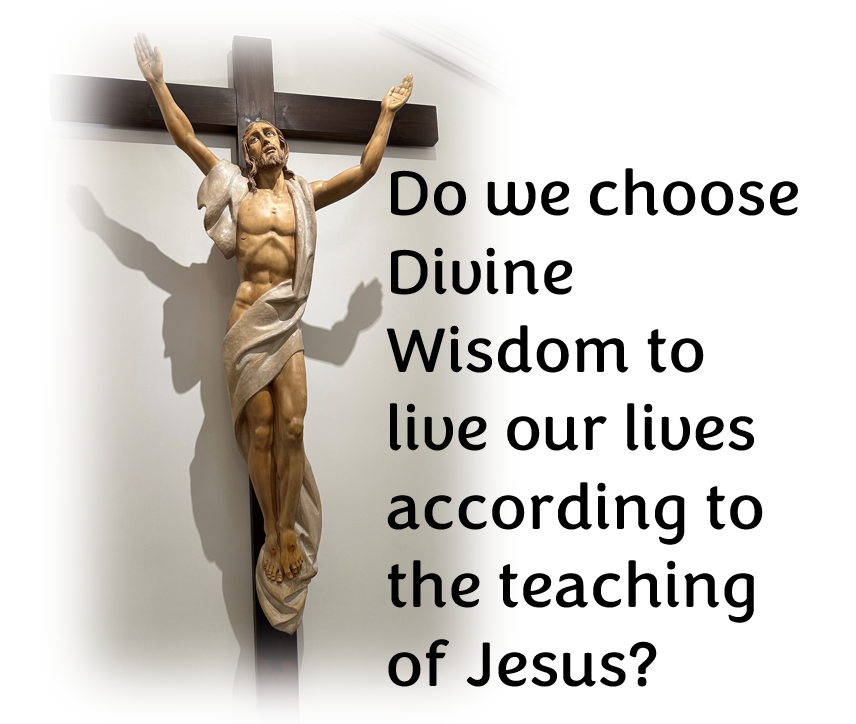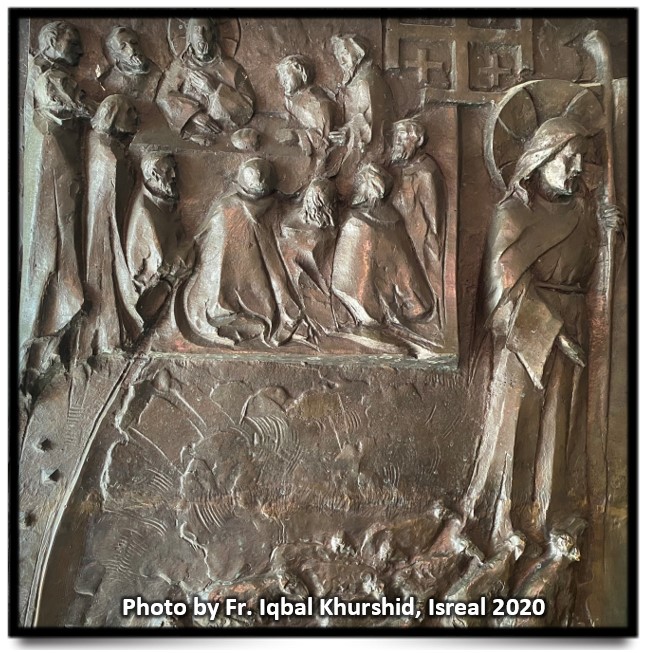
30th Sunday in Ordinary Time Year C ~ October 23, 2022
STANDARDS OF OUR SPIRITUAL LIFE
Once upon a time, there was a beautiful, red rose. She was the loveliest rose in the entire garden. However, she noticed that people would only look at her from afar. One day, she realized that there was a big, bumpy toad that was always at her side, and this was the reason that no one would get too close to look at her. Angry at having discovered this, the rose ordered the toad to leave immediately. “That’s fine, as you wish,” the toad replied obediently. Not long after, the toad passed by where the rose was planted, but was surprised to see that the rose was completely withered, without petals or leaves. The toad said to her, “Oh no! You look awful! What happened?” The rose replied, “Ever since you left, the ants have been eating my leaves day after day and now I’ll never be the same!” The toad replied, “Well, yes. When I was next to you, I would eat all the ants. That’s why you were always the most beautiful rose in the garden.”
Many times, we don’t appreciate those around us because we think they don’t do anything for us. This division has often led people to believe themselves as either superior or inferior to others. Although looking down our noses at others is something still unfortunately common to this day, the truth is that we need to start seeing ourselves as equally valued to those around us. Being aware of and strengthening our self-worth is important for feeling well, balanced, and able to relate in a healthy way.
St. Peter Chrysologus reflecting on the coming of Jesus which has raised our standards of our spiritual life, says that “The holy Apostle has told us that the human race takes its origin from two men, Adam and Christ: two men equal in body but unequal in merit, wholly alike in their physical structure but totally unlike in the very origin of their being. The first man, Adam, he says, became a living soul, the last Adam a life-giving spirit. The first Adam was made by the last Adam, from whom he also received his soul, to give him life. The last Adam was formed by his own action; he did not have to wait for life to be given him by someone else but was the only one who could give life to all. The first Adam was formed from valueless clay, the second Adam came forth from the precious womb of the Virgin. In the case of the first Adam, earth was changed into flesh; in the case of the second Adam, flesh was raised up to be God. What more need be said? The second Adam stamped his image on the first Adam when he created him. That is why he took on himself the role, and the name, of the first Adam, in order that he might not lose what he had made in his own image. The first Adam, the last Adam; the first had a beginning, the last knows no end. The last Adam is indeed the first; as he himself says: I am the first and the last. I am the first, that is, I have no beginning. I am the last, that is, I have no end. But what was spiritual, says the Apostle, did not come first, what was living came first, then what is spiritual. The earth comes before its fruit, but the earth is not so valuable as its fruit. The earth exacts pain and toil; its fruit bestows subsistence and life. The prophet rightly boasted of this fruit: Our earth has yielded its fruit. What is this fruit? The fruit referred to in another place: I will place upon your throne one who is the fruit of your body. The first man, says the Apostle, was made from the earth and belongs to the earth; the second man is from heaven, and belongs to heaven”.
He continues to reflect “The man made from the earth is the pattern of those who belong to the earth; the man from heaven is the pattern of those who belong to heaven. How is it that these last, though they do not belong to heaven by birth, will yet belong to heaven, men who do not remain what they were by birth but persevere in being what they have become by rebirth? The reason is, brethren, that the heavenly Spirit, by the mysterious infusion of his light, gives fertility to the womb of the virginal font. The Spirit brings forth as men belonging to heaven those whose earthly ancestry brought them forth as men belonging to the earth, and in a condition of wretchedness; he gives them the likeness of their Creator. Now that we are reborn, refashioned in the image of our Creator, we must fulfill what the Apostle commands: So, as we have worn the likeness of the man of earth, let us also wear the likeness of the man of heaven. Now that we are reborn, as I have said, in the likeness of our Lord, and have indeed been adopted by God as his children, let us put on the complete image of our Creator so as to be wholly like him, not in the glory that he alone possesses, but in innocence, simplicity, gentleness, patience, humility, mercy, harmony, those qualities in which he chose to become, and to be, one with us”.
Saints in our faith, are the main source of understanding our standards of spiritual life and deepen our relationship with the Lord. Here are some quotes from the saints to understand our stands of our spiritual life.
“Jesus Christ, Lord of all things! You see my heart; you know my desires. Possess all that I am—you alone. I am your sheep; make me worthy to overcome the devil.”
St. Agatha
“It is better to be a child of God than king of the whole world.”
St. Aloysius Gonzaga
“He who trusts in himself is lost. He who trusts in God can do all things.” “What does it cost us to say, ‘My God help me! Have mercy on me!’ Is there anything easier than this? And this little will suffice to save us if we be diligent in doing it.”
St. Alphonsus Liguori
“It is with the smallest brushes that the artist paints the most exquisitely beautiful pictures.”
St. André Bessette
“If according to times and needs you should be obliged to make fresh rules and change current things, do it with prudence and good advice.”
“The last word that I address to you and one I urge upon you with all the ardor of my soul, is that you live in harmony, united together in one heart and one will. Be bound to one another by the bonds of charity, treating each other with respect, helping one another, bearing with each other in Christ Jesus: if you really try to live like this, there is no doubt that the Lord, our God, will be in your midst.”
“Do not lose heart, even if you should discover that you lack qualities necessary for the work to which you are called. He who called you will not desert you, but the moment you are in need he will stretch out his saving hand.”
St. Angela Merici
“No one will have any other desire in heaven than what God wills; and the desire of one will be the desire of all; and the desire of all and of each one will also be the desire of God.”
St. Anselm
“Nowhere other than looking at himself in the mirror of the Cross, can man better understand how much he is worth. Christians must lean on the Cross of Christ just as travelers lean on a staff when they begin a long journey. They must have the Passion of Christ deeply embedded in their minds and hearts, because only from it can they derive peace, grace, and truth. Actions speak louder than words; let your words teach and your actions speak.”
St. Anthony of Padua
“Pray as though everything depended on God. Work as though everything depended on you. What does love look like? It has the hands to help others. It has the feet to hasten to the poor and needy. It has eyes to see the misery and want. It has the ears to hear the sighs and sorrows of men. That is what love looks like. God loves each of us as if there were only one of us.”
St. Augustine
“O sinner, be not discouraged, but have recourse to Mary in all your necessities. Call her to your assistance, for such is the divine Will that she should help in every kind of necessity.” As the sun surpasses all the stars in lustre, so the sorrows of Mary surpass all the tortures of the martyrs.”
St. Basil the Great
In the First reading Sirach is speaking about three aspects of profound faith and spirituality: first, there is no partiality in God because he has created everyone on his own image, and he loves us. He listens to the prayer of the humble without partiality. Secondly, He does not ignore the needy, suffering and marginalized of the society when they cry out to him. Thirdly He does not return the prayers of the righteous and humble without answering them. After reflecting on the First Reading, we may question ourselves: Why do we come to Church?
The Apostle Paul, at the end of his life, makes a final reckoning and says: “I have kept the faith” . But how did he keep the faith? Not in a strong box! Nor did he hide it underground, like the somewhat lazy servant. Saint Paul compares his life to a fight and to a race. He kept the faith because he didn’t just defend it, but proclaimed it, spread it, brought it to distant lands. He stood up to all those who wanted to preserve, to “embalm” the message of Christ within the limits of Palestine. That is why he made courageous decisions, he went into hostile territory, he let himself be challenged by distant peoples and different cultures, he spoke frankly and fearlessly. Saint Paul kept the faith because, in the same way that he received it, he gave it away, he went out to the fringes, and didn’t dig himself into defensive positions.
Before I reflect on the Gospel reading let me share a story to help us to understand our standards of spiritual life. The word of God today helps us to pray through three figures: in Jesus’ parable both the Pharisee and the tax collector pray.
Once a ship was wrecked at sea due to storm and out of all the crew only two men baled and swam to a small, deserted island. After both reached island, they didn’t know what to do. They talked and reached the conclusion that there was nothing they could do except to pray to God and wait for recue. However, they both decided to divide territory and stay at opposite side of the island. They did this to determine who prayers would be more effective. First thing they needed was food. So, the first man prayed for food and the next day he found fruits bearing trees on his side and saw that other man’s side was still barren. After two weeks, the first man felt lonely and prayed for a wife and the next day a woman survivor from a shipwreck swam to his side of land but still nothing on other side.
The next morning the first man prayed for home and clothes and more food and like magic he got all those things, but nothing changed for other man. Finally, the first man prayed for a ship so that he and his wife could leave that island and the next morning a ship docked at his side of the island. He boarded onto ship with his wife, and he thought “since none of that person’s prayers have been answered. He is unworthy of leaving that island. So, he decided to leave the man on the island but as he was leaving, he heard the voice from the sky “why are you leaving your companion on the island?” He replied “Since I got everything I prayed for, that means my blessings are result of my faith and prayers. His prayers were unanswered that’s why he has nothing on his side and so I figured out that he does not deserve to leave the island with me”. Voice from sky responded “you are sorely mistaken. You are in great debt to that man”. “How is that?” asked the first man. “It was that person’s faith and prayer that invoked your blessings as he was one who prayed that all your prayers might be answered”. Replied the voice from sky.
In the Gospel of this Sunday, the prayer of the Pharisee begins in this way: “God, I thank you”.
This is a great beginning, because the best prayer is that of gratitude, that of praise. Immediately, though, we see the reason why he gives thanks: “that I am not like other men”. He also explains the reason: he fasts twice a week, although at the time there was only a yearly obligation; he pays tithes on all that he has, though tithing was prescribed only on the most important products. In short, he boasts because he fulfils commandments to the best degree possible. But he forgets the greatest commandment: to love God and our neighbour. Brimming with self-assurance about his own ability to keep the commandments, his own merits, and virtues, he is focused only on himself. The tragedy of this man is that he is without love. Even the best things, without love, count for nothing, as Saint Paul says. Without love, what is the result? He ends up praising himself instead of praying. In fact, he asks nothing from the Lord because he does not feel needy or in debt, but he feels that God owes something to him. He stands in the temple of God, but he worships a different god: himself. And many “prestigious” groups, “Catholic Christians”, go along this path.
Together with God, he forgets his neighbour; indeed, he despises him. For the Pharisee, his neighbour has no worth, no value. He considers himself better than others, whom he calls literally “the rest, the remainders”. How many times do we see this happening over and over again in life and history? How many times do those who are prominent, like the Pharisee with respect to the tax collector, raise up walls to increase distances, making other people feel even more rejected? Even Christians who pray and go to Mass on Sunday are subject to this religion of the self. Let us examine ourselves and see whether we too may think that someone is inferior and can be tossed aside, even if only in our words. Let us pray for the grace not to consider ourselves superior, not to believe that we are alright, not to become cynical and scornful. Let us ask Jesus to heal us of speaking ill and complaining about others, of despising this or that person: these things are displeasing to God.
I think we need to turn to the other prayer. The prayer of the tax collector helps us understand what is pleasing to God. He does not begin from his own merits but from his shortcomings, not from his riches but from his poverty. His was not economic poverty – tax collectors were wealthy and tended to make money unjustly at the expense of their fellow citizens – but he felt a poverty of life, because we never live well in sin. The tax collector who exploited others admitted being poor before God, and the Lord heard his prayer, a mere seven words but an expression of heartfelt sincerity. In fact, while the Pharisee stood in front on his feet, the tax collector stood far off and “would not even lift up his eyes to heaven”, because he believed that God is indeed great, while he knew himself to be small. He “beat his breast” because the breast is where the heart is. His prayer is born straight from the heart; it is transparent. He places his heart before God, not outward appearances. To pray is to stand before God’s eyes, it is God looking at me when I pray.
Today, looking at the tax collector, we rediscover where to start from the conviction that we, all of us, are in need of salvation. This is the first step of the true worship of God, who is merciful towards those who admit their need. We do not come to Church to be better than others. We come to Church because we believe, and we are called to express our belief. There is no superiority in spirituality but if there is then remember the words of St. Paul “Therefore you have no excuse, whoever you are, when you judge others; for in passing judgment on another you condemn yourself, because you, the judge, are doing the very same things” (Romans 2:1). Let us ask today that God will strengthen this faith within us and show us His way in our daily lives. Amen.
Other Sermons In This Series
DIVINE MERCY SUNDAY YEAR C ~ APRIL 27, 2025
April 24, 2025

32nd Sunday in Ordinary Time – Year A ~ November 12, 2023
November 10, 2023

28th Sunday in Ordinary Time Year C – October 9, 2022
October 07, 2022

